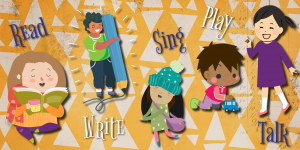
Did you know that some kinds of talking are better than others? Check out the list below to learn more about how the way you talk to your child can help them learn and grow.
Babies (0-18 months)
- The American Academy of Pediatrics recommends no screen time for children under 18 months old—unless they are video chatting. Video chatting with a friend or relative can be a great way to engage your baby in conversation and expose them to more vocabulary!
- Narrate your day to your baby. This builds vocabulary, even if they can’t respond yet. Plus, your baby will come to understand what you are saying months before they can talk.
Toddlers (18-36 months)
- Use descriptive language when talking with your children, especially toddlers. Children hear a lot of directive language in their daily lives (i.e., “Don’t touch the stove.” “Put on your shoes.”), but they also need to hear more descriptive words, too. For example, instead of, “Put on sunscreen,” you could try saying, “It’s very hot outside today! Let’s lather on some cool sunscreen from the blue bottle, so you won’t get an itchy sunburn!”
- Did you know young children need 5-12 seconds to hear you ask a question, think of an answer, and then respond? Even if they are not responding yet, leaving time after a question for your children to think teaches them how a conversation works, with back and forth dialogue.
-
 Use unfamiliar words when talking with your child. For example, instead of saying, “Do you see the bird by the cactus?”, you could ask, “Do you see the family of quail by the prickly pear?” Knowing more words builds vocabulary and background knowledge, both of which will help children when they are later learning to read.
Use unfamiliar words when talking with your child. For example, instead of saying, “Do you see the bird by the cactus?”, you could ask, “Do you see the family of quail by the prickly pear?” Knowing more words builds vocabulary and background knowledge, both of which will help children when they are later learning to read.
Preschoolers (3-5 year-olds)
- Play rhyming games with your child. Rhymes are great ways to help children hear the smaller sounds in words, which will help them read later.
- Children need language to think about math. Talk with your children about the words for numbers, shapes, and quantity (more, less, etc.). The more math words children hear as young children, the more their mathematical knowledge increases over the school year.
- Don’t shy away from difficult conversations. It’s much better for you to talk with your child about racism and the Covid-19 virus than for them to build their knowledge of these things based on assumptions you didn’t even know they had.
 Read, Write, Talk, Sing, Play!
Read, Write, Talk, Sing, Play!
The day children are born, their brains are primed for language. Talking with your child about anything and everything helps them build oral language skills, which are critical to early literacy!
Read more about early literacy and how you can make a difference in your child's life.

